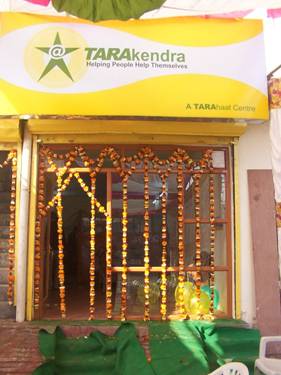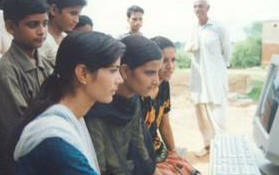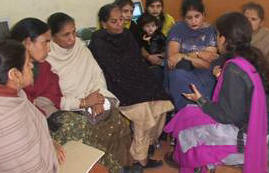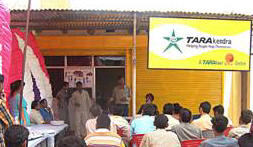Expanding HorizonsTARAkendras – part of TARAhaat expansion programme are slowly proliferating – facing tremendous challenges but providing unprecedented opportunities to people: A report from those who made it happen
TARAhaat has reached the 100 TARAkendras milestone. Wow!! That’s really a good news. Yes, it is. But it would have been really great had it been achieved, at least, a couple of years ago. It has been a (frustratingly) long and (agonisingly) painful wait for many of us, both within and outside TARAhaat. Since early 2003, TARAhaat embarked on its ambitious roll-out programme in Punjab after gaining the much-needed confidence from the success of the field-tests of its telecentre model, which it had conducted a year earlier in the Bundelkhand region of UP and MP. It has been a long, arduous and tortuous journey that started from the rocky terrains of Bundelkhand and lost its track for a while in the never-ending fields of Punjab. But recently, to the relief of many of TARAhaat’s well wishers and stakeholders, it has again found its direction and gained momentum. Hopefully, this momentum will continue till it reaches the next big milestone – not just 200, 300 or even 500 TARAkendras but – of making the entire TARAhaat network comprising TARAkendras, Territory Offices and Head Office viable and sustainable. There is however, no denying that it is an important landmark for all of us to celebrate as it has helped us reach the most underserved communities located in far-flung areas of the country still untouched by ICTs and has also brought us closer, by few inches, towards achieving self-sustainability. To achieve the 100 TARAkendras milestone, TARAhaat has penetrated in Punjab and Bundelkhand, the areas it has already been working and also expanded its operations to new territories like Bihar, Jharkhand and Chhattisgarh. To everyone’s surprise, the response in the new territories, especially Bihar, has been highly encouraging. These new territories offer huge potential for growth and expansion of ICT services. This can also be largely attributed to TARAhaat’s ability to forge partnerships and alliances with networks and organizations within and outside the Development Alternatives Group.The network of PACS (Poorest Areas Civil Society) partners is one such important network of the DA Group which has over 400 CSO (Civil Society Organisation) partners spread across six states of Bihar, Jharkhand, Chhattisgarh, Uttar Pradesh, Madhya Pradesh and Maharashtra. The other important and latest development on the expansion front has been signing of MoU in June this year between the Development Alternatives Group and the Indian Space Research Organisation (ISRO) for setting-up of Village Resource Centres (VRCs). Over the next year and half, TARAhaat will have to stretch its resources to the limits to achieve network viability. In addition to it, TARAhaat will also have to gear itself up to the opportunities and the challenges that would be thrown open by the up-coming Common Service Centre (CSC) programme of the Govt. of India.
To achieve network viability, TARAhaat will not only have to sustain
the growth rate
This growth itself is expected to offer major challenges on several fronts. Merely expanding the number of TARAkendras would not serve any purpose. For them to serve their respective communities and also to contribute to TARAhaat’s network viability, these centres will have to start offering, at the earliest, as many services as are available in TARAhaat’s portfolio. Internally, the biggest challenge would be on the staffing front. Attracting talented and experienced individuals with a heart for development along with strong capacity to deliver itself is going to be quite challenging. Strengthening and expanding their capacity to operationalise the centres in the shortest possible time from the date of their signing-up would be another major challenge. This task gets further compounded by the fact that most of the people carry strong negative perceptions about the poor infrastructural facilities that exist in these territories. The second most important challenge would be to build the capacity of franchise staff to offer a diverse range of information and services through the TARAhaat centres. Their capacity will have to be built on three major fronts – domain knowledge of the services offered, care and management of the centres on an ongoing basis and mobilisation and outreach methods for creating mass awareness about ICT. The support systems required to ensure all of the above have been TARAhaat’s forte since the beginning. In fact, the biggest gain for TARAhaat so far has been its partners who have, with few exceptions, stood by it from the beginning. It is TARAhaat’s excellent entrepreneur support systems – pre-set-up counselling, capacity building through regular trainings, post-set-up onsite handholding and guidance - that make its numerous franchisees happy and ticking. Be it the handholding and support it extends to the new entrepreneurs during the pre-set-up and post-set-up phases or be it the range and quality of trainings imparted to run and manage a telecentre, their immense value has been recognized by the entrepreneurs and their staff. TARAhaat’s ability to work with its partners to understand the requirements of rural communities and develop new products every year has also been greatly valued by its franchisees
However, in the changing scenario, with the centres being set-up in far-off places in Jharkhand, Bihar and Chhattisgarh, it will be a great challenge to maintain the quality and consistency of support that is being offered to partners in Punjab and Bundelkhand. The existing support systems would have to be strengthened to take care of the increasing demands that the rapidly growing network is expected to put on them. Finally, TARAhaat will have to develop new products and services that would be relevant to CSO partners and communities where new TARAkendras are being set-up. CSOs, because of their extended reach along with the trust that they enjoy within their communities are better suited to empower people by providing relevant IT-enabled content and access to ICTs. Moreover, they are also involved in the collection, dissemination and sharing of information related to various aspects of community development. As a result, they are expected to put ICTs to maximum use for the benefit of their communities. TARAhaat will have a major role to play in understanding their requirements for new product development and innovating and customizing the existing product delivery processes to ensure scalability. ISRO’s Village Resource Centre (VRC) project would also help a great deal in empowering rural communities through spatial information infrastructure as it aims at promoting a single window delivery of need based services in the areas of education, health, nutrition, weather, environment, agriculture and alternate livelihoods to the rural population.
Fortunately, the scalability and sustainability aspects have been built into TARAhaat’s model from the design stage itself and as a result the associated support systems and processes that have been designed and developed so far also take care of the scalability issues to a large extent. Also, as the experiential learnings derived from field implementations reside within TARAhaat, notwithstanding the nature, diversity and magnitude of the challenges offered by future growth, TARAhaat has the necessary wherewithal to manage this growth. All it needs to do is to continue displaying the same amount of passion, professionalism and above all, positivity as it has done in the past in its efforts towards creating an information society for all. q Surendra Rana srana@tarahaat.com
|

 it
has achieved over the last one year but will also have to raise it
further by several notches. For this, the newly set-up territory teams
will have to be strengthened and their capacity built to the extent that
they can start contributing to the growth without losing much time and
energy.
it
has achieved over the last one year but will also have to raise it
further by several notches. For this, the newly set-up territory teams
will have to be strengthened and their capacity built to the extent that
they can start contributing to the growth without losing much time and
energy.
